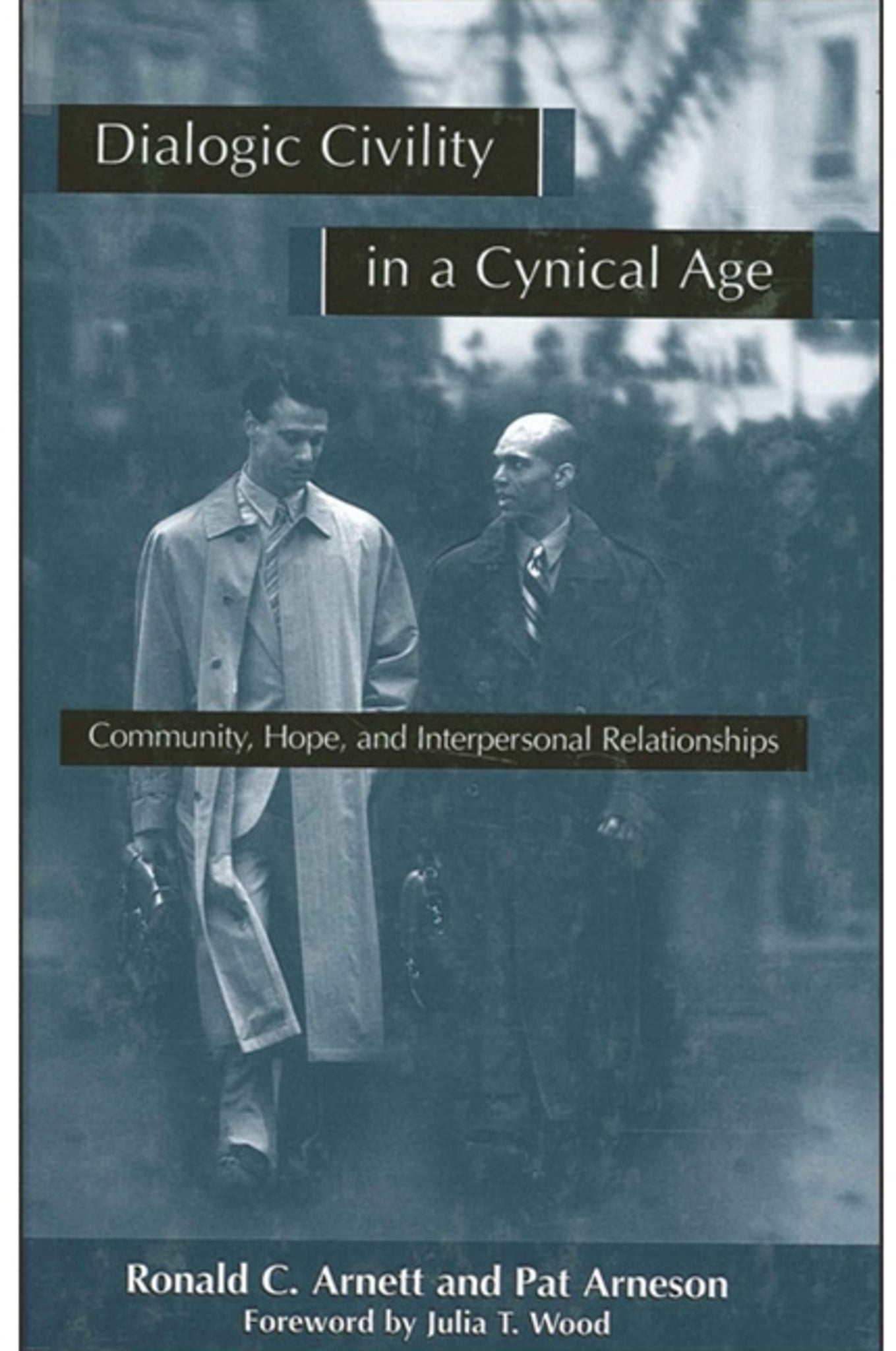We're sorry. An error has occurred
Please cancel or retry.
Dialogic Civility in a Cynical Age

Some error occured while loading the Quick View. Please close the Quick View and try reloading the page.
Couldn't load pickup availability
- Format:
-
30 September 1999

Offers insight and practical guidance for people interested in improving their interpersonal relationships in an age of rampant cynicism.
Dialogic Civility in a Cynical Age offers a philosophical and pragmatic response to unreflective cynicism. Considering that each of us has faced inappropriate cynical communication in families, educational institutions, and the workplace, this book offers insight and practical guidance for people interested in improving their interpersonal relationships in an age of rampant cynicism.


"It is a rare pleasure to read a scholarly book that offers a realistic basis for hope about the possibilities for enriched communication. In their book the authors offer hope—hope for human thought and action and, most especially, for human communication praxis." — From the Foreword by Julia T. Wood
"Dialogic Civility in a Cynical Age provides a dialogue with some common sense voices of reason, civility, caring, and interpersonal relations. It is truly a praxis—applying theories of dialogic communication and civility to our moment in history. How timely in this age, which places emphasis on recognition of diversity and yet also includes skinheads and hate groups. The book doesn't give a naïve view of the world. It takes a realistic look at dialogic communication and its possible role in countering much of today's unenlightened, unreflective cynicism about our communities and the future of our society." — T. Dean Thomlison, University of Evansville, Indiana
Foreword
Acknowledgments
Part I. Interpersonal Praxis: From Communicative Crisis To Narrative Action
1. Introduction: Beginning the Conversation
An Overview
Horizon of Significance
The Conceptual Key
2. Voices of Cynicism and Hope
Routine Cynicism
Interpersonal Suspicion
Language Disconnected from Action
Listening to Two Sides of Cynicism
Routine Cynicism as Debilitating
Cynicism as Survival Tool
The Wedding of Cynicism and Hope
Pain and Joy
Hope within Limits
3. Historicality and Presence
A Foundation for Communicative Change
Historicality
Missing the Historical Moment
Meeting the Historical Moment
Dialogic Limits
A Dialogic Perspective
A Practical Dialectic
Interpersonal Praxis as Historical Common Sense
Interpersonal Commonplaces
4. Common Ground: Interpersonal Narrative
Opening Narrative Structures
Narrative Background
From Metanarrative to Therapeutic Culture
Historical Mismatch—The Therapeutic Metaphor
An Overextended Metaphor
Walter Lippmann's Warning
A Narrative Ethic for Interpersonal Discourse
Part II. Interpersonal Voices
Section 1. Narrative Decline: Interpersonal Dialogue and Self
5. Carl Rogers: A Voice of Pragmatic Optimism
Introduction
Significance of Carl Rogers's Life and Practice
A Founding Voice
Scope of Carl Rogers's Influence
The Quiet Revolutionary
Communicative Focus
Historical Grounding
An Optimistic Listener
Central Concepts in Carl Rogers's Work
Self
Innate Wisdom of the Human Organism
Relationship
Historicality and Dialogic Civility
6. Abraham Maslow: Science, Values, and Additive Change
Introduction
Significance of Abraham Maslow's Science/Values Project
Additive Approach to Science
Additive Education
Self in Service to the Other
Central Concepts in Abraham Maslow's Work
A Science of Interpersonal Health
Human Values
Self-Actualization and Earned Self-Esteem
Peak-Experiences
Historicality and Dialogic Civility
Section 2. Narrative Confrontation: Interpersonal Dialogue and Crisis
7. Martin Buber: Attending and Response Between Persons
Introduction
Martin Buber's Common Center: The Between
Horizon of the Between
The Existential-Phenomenological Nature of the Between
Ambiguity, Story, and Guidance
A Communicative Poetic
Central Concepts in Martin Buber's Work
The Great Character
Dialogue
Focus of Attention
Authenticity
Historicality and Dialogic Civility
8. Carol Gilligan: Gender and Moral Voice
Introduction
Historical Context: A Window for Cynicism
Moral Voices
Central Concepts in Carol Gilligan's Work
Female Adolescence
Disconnection
Re-Connection and Care
Responsibility in Relationship-Grounded Caring
A Dialectical Dance
A Morality of Care
Voice and Inclusion
Historicality and Dialogic Civility
9. Paulo Freire: Dignity and the Limits of Inclusion
Introduction
Interpersonal Pedagogy
Humility
Praxis
Affirming the Other
The Limits of Inclusion
Central Concepts in Paulo Freire's Work
Rejecting a Culture of Silence
Narrative Sickness
Critical Consciousness
Dialogue
Historicality and Dialogic Civility
10. Sissela Bok: Crisis and Ethical Imagination
Introduction
Ethics and Postmodernity
Communication without Ethical Coherence
Central Concepts in Sissela Bok's Work
Lying
Secrets
Peace
Common Values
Historicality and Dialogic Civility
11. Viktor Frankl: Meaning, Displacement, and Courage
Introduction
Lived Life as Thoughtful Action
Central Concepts in Viktor Frankl's Work
Pragmatic Spiritualism
Meeting Disappointment and Suffering
Discovering Meaning
Tripod of Meaning
Tragic Triad
Freedom
Problematic Assumptions
Self-Actualization
Contrary to the Pleasure Principle
Choosing Meaning
Historicality and Dialogic Civility
Section 3. Narrative Construction: Interpersonal Dialogue and Story
12. Nel Noddings: Re-Storying an Ethic of Care
Introduction
Re-Storying Ethics
Missing Stories
Caring as Story
Moral Education
Central Concepts in Nel Noddings's Work
Reducing Evil
An Ethic of Caring
Caring in Relation
Risks of Caring
Intuition and Interpersonal Reasoning
Intuitive Capacities
Complementary to Reason
Meaning and Story
Historicality and Dialogic Civility
13. Robert Bellah: Re-Storying Broken Covenants
Introduction
The Practices of Identity
Individualism
Therapeutic Limits
Characters of Modern Life
Central Concepts in Robert Bellah's Work
Broken Covenants
Tacit Understanding of a Problematic Story
Communicative Background—The Common Good
Inviting Community
Historicality and Dialogic Civility
Part III. Dialogic Civility
14. The Interpersonal Praxis of Dialogic Civility
From Privatized to Public Discourse
A Minimal Foundation for Dialogic Civility
Respect and Civility
Civility and the Other
A Call for Dialogic Civility
From Unreflective Practice to Praxis
Our Historical Problematic
Practical Philosophy of Dialogic Civility
Conclusion—Dialogic Civility
Works Cited
Index



